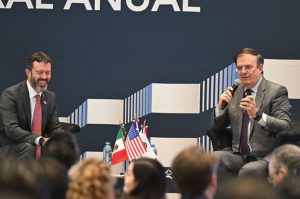 -Editorial
-Editorial
The American Society of Mexico (AmSoc) convened its fourth Binational Convention this week, drawing diplomats, government officials, business leaders, academics, and civil society representatives from both sides of the border for two days of high-level dialogue on the future of U.S.-Mexico relations.
The event in Mexico City focused on strengthening bilateral ties while exploring opportunities for cooperation in trade, security, innovation, sustainability, and regional development. Organizers described the convention as a strategic forum to address shared challenges and highlight areas where both nations can work together for long-term prosperity.
The convention opened with remarks from U.S. Ambassador to Mexico Ronald Johnson, who emphasized the depth of commercial, cultural, and family connections between the two countries. He called the bilateral relationship unique and pointed to its importance not only for governments but also for millions of families and businesses that depend on cross-border cooperation.
AmSoc President Larry Rubin said the forum has grown into a key space for dialogue between decision-makers and stakeholders from across North America. He praised recent actions by the Mexican government, including tariffs on imports from countries outside the United States-Mexico-Canada Agreement (USMCA), saying the measure strengthens Mexico’s global competitiveness as a destination for foreign investment.
Rubin also highlighted President Claudia Sheinbaum’s commitment to reviewing non-tariff barriers, which he said signals Mexico’s readiness to consolidate its role as a central player in regional economic integration. “These actions send a clear message,” Rubin said. “Mexico is ready to attract investment and create high-value jobs.”
Beyond trade, security was a recurring theme. Rubin noted that public safety remains a top priority for both countries and welcomed the creation of a high-level binational group to combat organized crime. He also praised the work of Mexico’s Security Ministry under Omar García Harfuch.
Speakers addressing security included Sergio de la Peña, former U.S. deputy assistant secretary of defense, and Salvador Guerrero Chiprés, head of Mexico City’s C5 intelligence and security center. Both discussed the complexity of organized crime networks and stressed the importance of cross-border collaboration in addressing threats to public safety and economic stability.
The convention also gave space to issues impacting border communities and Mexican nationals living abroad. Tatiana Clouthier, head of the Institute for Mexicans Abroad, outlined challenges and opportunities for the diaspora, noting its role in strengthening economic and cultural ties.
Laredo Mayor Victor Treviño and McAllen Mayor Javier Villalobos, both representing Texas border cities, underscored the importance of border communities as engines of regional trade and integration. They highlighted infrastructure investments and cross-border cooperation as essential to sustaining growth.
The convention featured the participation of diplomats from Switzerland and Italy, who offered perspectives on global alliances and Mexico’s evolving role in international trade. Their presence underscored the forum’s broad reach beyond U.S.-Mexico relations.
Executives from multinational corporations also took part, including Francisco Garza of General Motors Mexico, Rafael Sánchez of Microsoft Mexico, and José Fernandes of Honeywell Latin America. They discussed innovation, digital transformation, and nearshoring opportunities. The business leaders emphasized the importance of public-private partnerships, workforce training, and infrastructure investment to strengthen Mexico’s competitiveness in global markets.
Over the two-day program, the convention hosted panels, keynote speeches, and roundtable discussions on a wide range of topics. Sessions addressed trade policy, supply chain resilience, renewable energy, inclusion, and sustainability. Participants also explored opportunities in key industries such as tourism, automotive, aerospace, pharmaceuticals, and agribusiness.
Nearshoring, the trend of relocating supply chains closer to the North American market, was a major focus. Business leaders and policymakers said Mexico is well-positioned to capitalize on the shift but must continue to address regulatory barriers, invest in infrastructure, and expand its skilled labor force.
By the conclusion of the convention, AmSoc leaders said the gathering reaffirmed the spirit of cooperation between Mexico and the United States. The forum, they said, served as a reminder that despite political and economic challenges, both nations share mutual interests in stability, growth, and prosperity.
Founded more than 80 years ago, the American Society of Mexico is a nonprofit, nonpartisan organization that connects the U.S. community in Mexico with businesses, civic groups, and the wider public. The group works to build partnerships and strategic solutions that promote shared development.


